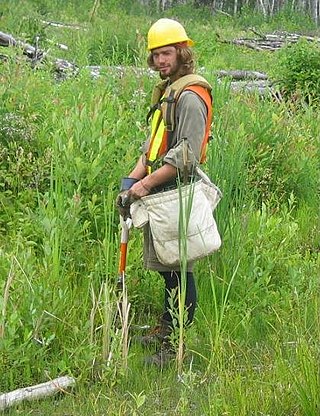
Tree planting is the process of transplanting tree seedlings, generally for forestry, land reclamation, or landscaping purposes. It differs from the transplantation of larger trees in arboriculture and from the lower-cost but slower and less reliable distribution of tree seeds. Trees contribute to their environment over long periods of time by improving air quality, climate amelioration, conserving water, preserving soil, and supporting wildlife. During the process of photosynthesis, trees take in carbon dioxide and produce oxygen.

The Strzelecki Ranges is a set of low mountain ridges located in the West Gippsland and South Gippsland regions of the Australian state of Victoria.
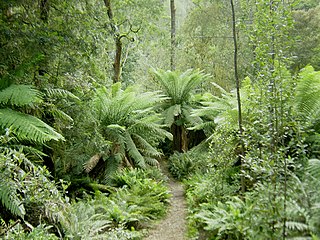
The Tarkine, officially takayna / the Tarkine, is an area containing the Savage River National Park in the north west Tasmania, Australia, which contains significant areas of wilderness. The Tarkine is noted for its beauty and natural values, containing the largest area of Gondwanan cool-temperate rainforest in Australia, as well as for its prominence in Tasmania's early mining history. The area's high concentration of Aboriginal sites has led to it being described by the Australian Heritage Council as "one of the world's great archaeological regions".

Santalum spicatum, the Australian sandalwood, also Waang and other names (Noongar) and Dutjahn (Martu), is a tree native to semi-arid areas at the edge of Southwest Australia, in the state of Western Australia. It is also found in South Australia, where it is protected and listed as a vulnerable species. It is traded as sandalwood, and its sandalwood oil has been used as an aromatic and a food source over history. S. spicatum is one of four Santalum species occurring in Australia.
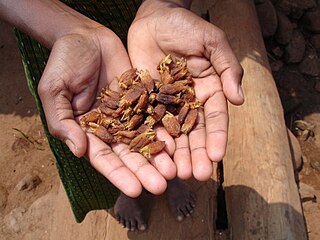
Non-timber forest products (NTFPs) are useful foods, substances, materials and/or commodities obtained from forests other than timber. Harvest ranges from wild collection to farming. They typically include game animals, fur-bearers, nuts, seeds, berries, mushrooms, oils, sap, foliage, pollarding, medicinal plants, peat, mast, fuelwood, fish, insects, spices, and forage. Overlapping concepts include non-wood forest products (NWFPs), wild forest products, minor forest produce, special, minor, alternative and secondary forest products – for further distinctions see the definition section below

Woodchipping is the act and industry of chipping wood for pulp. Timber is converted to woodchips and sold, primarily, for paper manufacture. In Australia, woodchips are produced by clearcutting or thinning of native forests or plantations. In other parts of the world, forestry practices such as short rotation coppice are the usual methods adopted.

Francis Michael Logan is a former politician in Western Australia, who was the Minister for Emergency Services and Corrective Services in the McGowan Labor Government from 2017 to 2021,.

Forestry in New Zealand has a history starting with European settlement in the 19th century and is now an industry worth seven percent of annual revenue. Much of the original native forest cover was burnt off and logged, however forests have been extensively planted, predominantly with fast-growing cultivars of the Monterey Pine. Wood chips, whole logs, lumber and paper products are exported from New Zealand.
Forestry in Tasmania Australia has been conducted since early European settlement. The logging of old growth native forests in the state has been opposed by environmentalists and others via means such as lobbying, legislation and blockades.
The Tasmanian Forests Intergovernmental Agreement (TFIA) is an agreement between the Commonwealth of Australia and the State of Tasmania. It is designed to create additional areas of forest reserves in the State of Tasmania, while ensuring ongoing wood supply for the forest industry. It was signed by Australian Prime Minister, Julia Gillard, and Tasmania's Premier, Lara Giddings, on August 7, 2011.

Stingray Swamp Flora Reserve (SWFR) is located immediately north of Penrose township in the south-western region of Wingecarribee Shire. The reserve is primarily surrounded by the Penrose State Forest, which is a commercially active plantation forest administered by the Forest Corporation NSW. Pine species dominate the state forest with a mix of native vegetation types in isolated pockets and adjacent areas. Stingray Swamp Flora Reserve belongs to a larger wetland complex known as the Paddy's River Wetland Complex (PRWC). These wetlands also form part of the Paddy's River sub-catchment, which belong to the larger Hawkesbury-Nepean catchment. Historic use of this area has mainly been that of pine plantation, agriculture and mining activities. The forest is publicly accessible and therefore is a site of mixed recreational activities.

The Forests Department was a department of the Government of Western Australia created in 1919 under Conservator of Forests Charles Lane Poole, that was responsible for implementing the State's Forests Act (1918–1976) legislation and regulations.
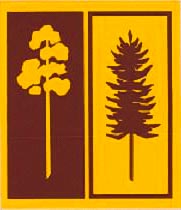
The Forests Commission Victoria (FCV) was the main government authority responsible for management and protection of State forests in Victoria, Australia between 1918 and 1983.
The Department of Energy, Mines, Industry Regulation and Safety is a department of the Government of Western Australia. The department was formed on 1 July 2017, out of the former Department of Mines and Petroleum and Department of Commerce.
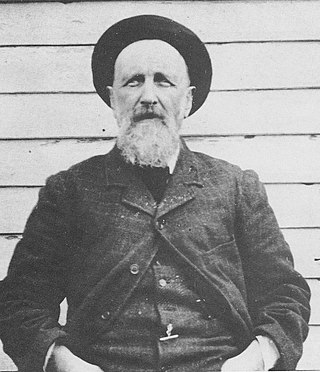
John La Gerche was a pioneering forester on the Victorian goldfields at Creswick, Australia in the late 19th-century.
The Victorian Plantations Corporation (VPC) of Victoria, Australia, was established under the State Owned Enterprises Act in May 1993, and by June 1993 was declared a State Business Corporation.

Redwoods of the Otway Ranges is a small sheltered grove of Coast Redwoods, Sequoia sempervirens, about 5 kilometres (3 mi) south of Beech Forest in the Otway Ranges in southwestern Victoria, Australia.
The Department of Planning, Lands and Heritage is the department of the Government of Western Australia responsible for planning and managing all land use and heritage considerations within the state. The Department was formed on 28 April 2017 as a merger of the former departments of Planning, Lands Management, the Heritage Council and the heritage and land management functions of the former Department of Aboriginal Affairs.
Elizabeth Jane Kelsbie is an Australian politician. She has been an Australian Labor Party member of the Western Australian Legislative Assembly for the electoral district of Warren-Blackwood since 2021.
The Department of Jobs, Tourism, Science and Innovation is a department of the Government of Western Australia. The department was formed on 1 July 2017, out of the former Department of State Development, the industry promotion and innovation functions of the Department of Commerce and the Western Australian Tourism Commission.














